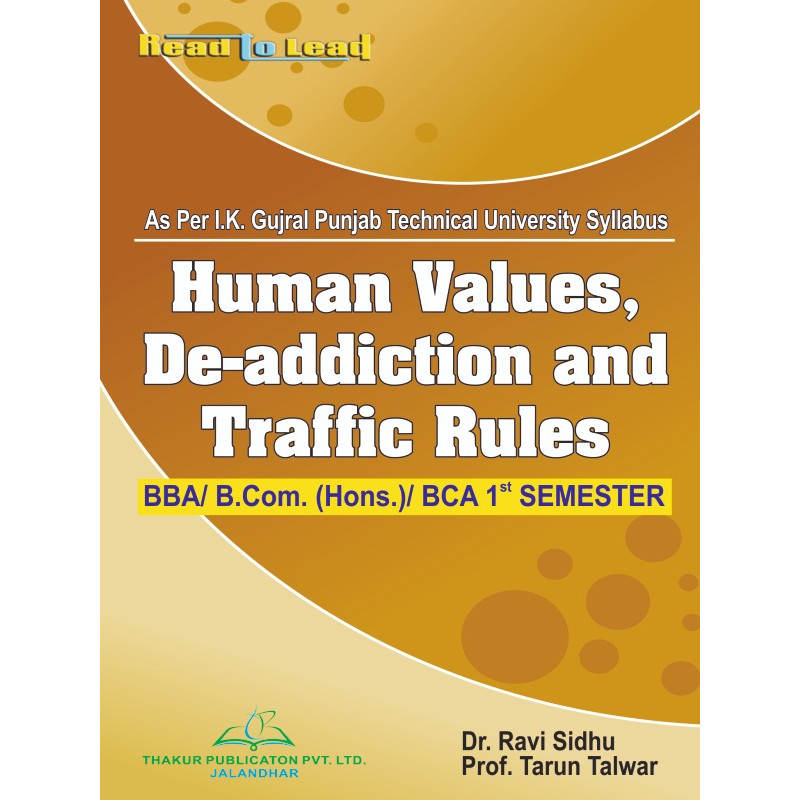




Dr. Saroj Kumar,
Pof. Sheenu Nayyar
ISBN No. 938-93-5163-970-1
Syllabus
AECC
HVPE 101-18 Human Values, De-addiction and Traffic Rules
Module 1
Course Introduction - Need, Basic Guidelines, Content and Process for Value Education (6)
1) Understanding the need, basic guidelines, content and process for Value Education
2) Self Exploration–what is it? - its content and process; ‘Natural Acceptance’ and Experiential Validation- as the mechanism for self exploration
3) Continuous Happiness and Prosperity- A look at basic Human Aspirations
4) Right understanding, Relationship and Physical Facilities- the basic requirements for fulfillment of aspirations of every human being with their correct priority
5) Understanding Happiness and Prosperity correctly- A critical appraisal of the current scenario
6) Method to fulfill the above human aspirations: understanding and living in harmony at various levels
Module 2
Understanding Harmony in the Human Being - Harmony in Myself! (6)
7) Understanding human being as a co-existence of the sentient ‘I’ and the material ‘Body’
8) Understanding the needs of Self (‘I’) and ‘Body’ - Sukh and Suvidha
9) Understanding the Body as an instrument of ‘I’ (I being the doer, seer and enjoyer)
10) Understanding the characteristics and activities of ‘I’ and harmony in ‘I’
11) Understanding the harmony of I with the Body: Sanyam and Swasthya; correct appraisal of Physical needs, meaning of Prosperity in detail
12) Programs to ensure Sanyam and Swasthya
- Practice Exercises and Case Studies will be taken up in Practice Sessions.
Module 3
Understanding Harmony in the Family and Society- Harmony in Human-Human Relationship (6)
13) Understanding harmony in the Family- the basic unit of human interaction
14) Understanding values in human-human relationship; meaning of Nyaya and program for its fulfillment to ensure Ubhay-tripti;
Trust (Vishwas) and Respect (Samman) as the foundational values of relationship
15) Understanding the meaning of Vishwas; Difference between intention and competence
16) Understanding the meaning of Samman, Difference between respect and differentiation; the other salient values in relationship
17) Understanding the harmony in the society (society being an extension of family): Samadhan, Samridhi, Abhay, Sah-astitva as comprehensive Human Goals
18) Visualizing a universal harmonious order in society- Undivided Society (Akhand Samaj), Universal Order (Sarvabhaum Vyawastha )- from family to world family!
- Practice Exercises and Case Studies will be taken up in Practice Sessions.
Module 4: Understanding Harmony in the Nature and Existence - Whole existence as Co-existence (4)
19) Understanding the harmony in the Nature
20) Interconnectedness and mutual fulfillment among the four orders of nature- recyclability and self-regulation in nature
21) Understanding Existence as Co-existence (Sah-astitva) of mutually interacting units in all-pervasive space
22) Holistic perception of harmony at all levels of existence
- Practice Exercises and Case Studies will be taken up in Practice Sessions.
Module 5: Implications of the above Holistic Understanding of Harmony on Professional Ethics (6)
23) Natural acceptance of human values
24) Definitiveness of Ethical Human Conduct
25) Basis for Humanistic Education, Humanistic Constitution and Humanistic Universal Order
26) Competence in professional ethics:
a) Ability to utilize the professional competence for augmenting universal human order,
b) Ability to identify the scope and characteristics of people-friendly and eco-friendly production systems,
c) Ability to identify and develop appropriate technologies and management patterns for above production systems.
27) Case studies of typical holistic technologies, management models and production systems
28) Strategy for transition from the present state to Universal Human Order:
a) At the level of individual: as socially and ecologically responsible engineers, technologists and managers
b) At the level of society: as mutually enriching institutions and organizations
Specific References